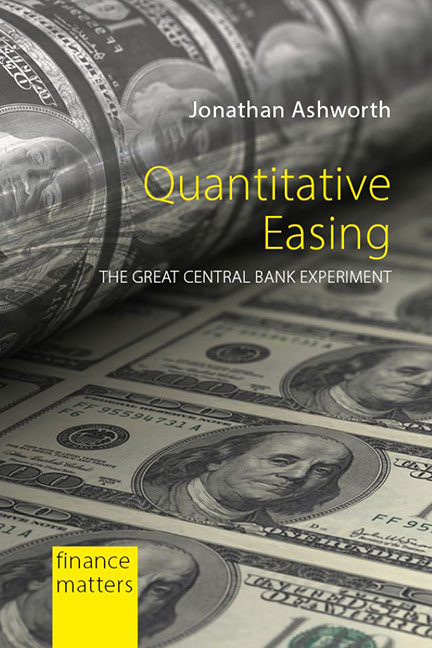Book contents
- Frontmatter
- Contents
- Preface and acknowledgements
- Abbreviations
- Foreword
- 1 Monetary policy-making since the end of Bretton Woods
- 2 Key monetary policy trends and events in the decades before the Great Financial Crisis
- 3 The Great Financial Crisis and the onset of quantitative easing
- 4 How quantitative easing works
- 5 Measuring the effectiveness and impact of quantitative easing
- 6 International spillovers of quantitative easing
- 7 Criticisms and negative externalities of quantitative easing
- 8 Exiting quantitative easing and policies for the next slowdown
- Conclusion
- Notes
- References
- Index
2 - Key monetary policy trends and events in the decades before the Great Financial Crisis
Published online by Cambridge University Press: 20 December 2023
- Frontmatter
- Contents
- Preface and acknowledgements
- Abbreviations
- Foreword
- 1 Monetary policy-making since the end of Bretton Woods
- 2 Key monetary policy trends and events in the decades before the Great Financial Crisis
- 3 The Great Financial Crisis and the onset of quantitative easing
- 4 How quantitative easing works
- 5 Measuring the effectiveness and impact of quantitative easing
- 6 International spillovers of quantitative easing
- 7 Criticisms and negative externalities of quantitative easing
- 8 Exiting quantitative easing and policies for the next slowdown
- Conclusion
- Notes
- References
- Index
Summary
After peaking at very elevated levels in the early 1980s as policy-makers attempted to end the Great Inflation, official central bank interest rates fell very sharply over subsequent decades, during a period commonly referred to as the “Great Moderation”. During the latter, there were several key events or periods for monetary policy which I will also discuss: the reaching of the ZLB on official interest rates in Japan after the bursting of its asset bubbles in 1990/91 and the onset of deflation; the reduction in US official interest rates to a record low of 1 per cent after the bursting of its Information Technology (IT) stockmarket bubble in 2000/2001; the introduction of QE in Japan in 2001.
The events in Japan were particularly noteworthy as it became the first central bank in modern times to reach the ZLB on official interest rates and to experiment with QE as it attempted to battle the protracted fallout from the bursting of its massive asset price bubbles. Meanwhile, the period of ultraloose US monetary policy in the years following the bursting of its IT bubble, as the Fed attempted to avoid falling into a Japanese-style deflationary scenario, proved particularly consequential as it helped “sow the seeds” of the enormous real estate bubble and the GFC once it finally burst. Admittedly, there were other major contributing factors which I briefly discuss. The experiences of the Japanese authorities with the ZLB, QE and other unconventional policies ultimately provided some lessons for the US authorities when their time came to enact such policies.
Sharply falling interest rates during the Great Moderation
After rising markedly during the 1970s and early 1980s amid the Great Inflation, inflation and official short-term central bank interest rates declined markedly in developed countries over subsequent decades (see Figures 1.1 and 2.1). The period from the mid-1980s up until the early rumblings of the GFC in the summer of 2007 is commonly referred to as the Great Moderation when industrial countries experienced significant reductions in the volatility of both their GDP growth and inflation and recessions were typically much shorter and shallower (Rivlin 2015).
- Type
- Chapter
- Information
- Quantitative EasingThe Great Central Bank Experiment, pp. 17 - 30Publisher: Agenda PublishingPrint publication year: 2020



